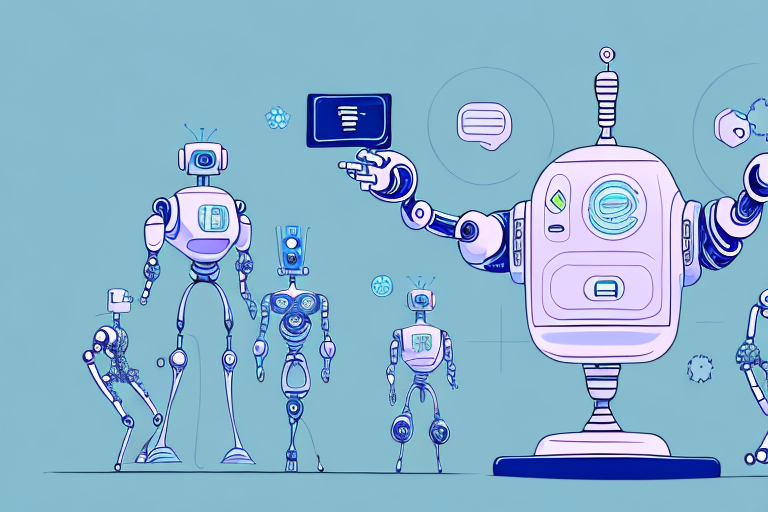How to Implement AI-Powered Customer Service for Improved Efficiency
In today’s fast-paced world, exceptional customer service is crucial for the success of any business. The integration of artificial intelligence (AI) into customer service operations has revolutionized how businesses interact with their customers. AI-powered customer service not only enhances the customer experience but also significantly improves business efficiency. Implementing AI in customer service, however, requires strategic planning and careful consideration. This article delves into the fundamentals of AI-powered customer service, its benefits, key considerations for implementation, steps to select the right AI solution, and future trends shaping the industry.
Understanding AI-Powered Customer Service
What is AI-Powered Customer Service?
AI-powered customer service utilizes technologies like chatbots and virtual assistants to simulate human-like interactions with customers through text or voice. These AI systems leverage natural language processing (NLP) and machine learning algorithms to comprehend and respond to customer inquiries effectively.
Core Technologies Behind AI Customer Service
- Natural Language Processing (NLP): Enables machines to understand and interpret human language.
- Machine Learning: Allows AI systems to learn from interactions and improve over time.
- Sentiment Analysis: Assesses the emotional tone behind customer communications to tailor responses appropriately.
The Advantages of AI-Powered Customer Service
24/7 Availability
AI-powered customer service solutions operate around the clock, providing customers with immediate assistance regardless of the time or day. This continuous availability helps in addressing customer needs promptly, enhancing satisfaction and loyalty.
Reduced Wait Times and Enhanced Efficiency
AI systems can handle a vast number of customer inquiries simultaneously, significantly reducing wait times. According to a Forrester report, businesses implementing AI chatbots have seen up to a 30% increase in customer satisfaction rates due to quicker response times.
Cost Savings
Implementing AI in customer service can lead to substantial cost savings. AI systems eliminate the need for large customer support teams, reducing expenses related to salaries and benefits. Additionally, AI can automate routine tasks, allowing human agents to focus on more complex issues.
Scalability
AI-powered solutions are highly scalable, making them ideal for businesses experiencing growth or seasonal spikes in customer inquiries. AI systems can effortlessly manage increased volumes without compromising on service quality.
Personalized Customer Support
AI algorithms analyze customer data to deliver personalized experiences. By understanding customer preferences and past interactions, AI can provide tailored recommendations and solutions, enhancing the overall customer experience.
Improved Accuracy and Consistency
AI systems provide consistent and accurate responses by accessing and processing vast amounts of data. This reduces the likelihood of human errors and ensures that customers receive reliable information every time.
Applications of AI in Customer Service
Frequently Asked Questions (FAQs) Handling
AI chatbots efficiently manage common queries, providing instant answers to frequently asked questions. This automation frees up human agents to address more nuanced customer issues.
Product Recommendations and Assistance
AI systems can analyze customer preferences and behaviors to offer personalized product recommendations, enhancing the shopping experience and driving sales.
Transaction Processing
AI-powered solutions can handle transactions such as order placements, payments, and refunds, streamlining the purchasing process for customers.
Appointment Scheduling
Automating appointment bookings and reservations through AI systems simplifies the scheduling process, ensuring seamless interactions between customers and businesses.
Technical Support
AI-driven technical support assists customers in troubleshooting issues, providing step-by-step guidance to resolve problems efficiently.
Sentiment Analysis
By analyzing customer feedback and interactions, AI can gauge customer sentiment, helping businesses identify areas for improvement and enhance customer satisfaction.
Implementing AI in Customer Service
Key Considerations Before Implementation
- Cost: Evaluate the financial investment required for purchasing, integrating, and maintaining AI solutions.
- Customer Needs: Assess the types of queries your customers typically have and determine if AI can effectively address them.
- System Integration: Ensure that the AI solution seamlessly integrates with your existing customer support systems and platforms.
- Training and Development: Invest in training for your staff to effectively manage and utilize AI-powered tools.
- Data Privacy and Security: Implement robust measures to safeguard customer data and comply with relevant regulations.
Choosing the Right AI-Powered Customer Service Solution
- Assess Business Needs: Identify the specific requirements of your business and ensure that the AI solution aligns with these needs.
- Compatibility: Verify that the AI system is compatible with your current software and platforms.
- Cost Evaluation: Analyze the total cost of ownership, including initial investment and ongoing maintenance expenses.
- Customization: Select a solution that allows customization to match your brand’s tone and style.
- Scalability: Ensure the solution can grow with your business and handle increasing customer inquiries.
- Vendor Support: Choose a provider that offers reliable support and comprehensive training resources.
Step-by-Step Guide to Implementing AI-Powered Customer Service
- Identify Customer Needs: Conduct an analysis to understand the common queries and requirements of your customers.
- Select an AI Solution: Choose an AI-powered customer service platform that fits your business needs and budget.
- Integrate with Existing Systems: Ensure the AI solution seamlessly connects with your current customer support infrastructure.
- Train Your Team: Provide comprehensive training to your staff on how to operate and manage the AI system.
- Launch the AI System: Roll out the AI-powered customer service solution and monitor its performance closely.
- Gather Feedback and Optimize: Collect feedback from customers and make necessary adjustments to improve the system’s effectiveness.
Implementing AI-powered customer service is an ongoing process that requires regular updates and maintenance to stay aligned with evolving customer needs and technological advancements.
Integrating AI with Human Support
Defining Roles and Responsibilities
Clearly delineate the roles of AI and human agents to ensure a harmonious and efficient customer service ecosystem. AI should handle routine inquiries, while human agents manage complex and sensitive issues.
Seamless Transition Between AI and Humans
Establish protocols that allow for smooth escalation from AI to human support when necessary. This ensures that customers receive the appropriate level of assistance without frustration.
Training Human Agents
Equip your human agents with the skills to work alongside AI systems effectively. This includes understanding how to interpret AI-generated data and handle escalated queries proficiently.
Maintaining Customer Experience Quality
Regularly review and refine the collaboration between AI and human support to maintain a high standard of customer service. Consistent quality checks help in identifying areas for improvement.
Measuring the Success of AI-Powered Customer Service
Key Performance Indicators (KPIs) and Metrics
- Customer Satisfaction Rate: Measures how satisfied customers are with the service they receive.
- First Contact Resolution Rate: Tracks the percentage of issues resolved in the first interaction.
- Response Time: Gauges the average time taken to respond to customer inquiries.
- Customer Retention Rate: Monitors the ability to retain customers over time.
- Cost Per Interaction: Calculates the average cost incurred for each customer interaction.
Analyzing Customer Feedback
Beyond quantitative metrics, qualitative feedback from customers provides valuable insights into their experiences and expectations. Utilize surveys, focus groups, and social media monitoring to gather comprehensive feedback.
Impact on Employee Satisfaction and Productivity
Assess how the integration of AI affects your employees. Ensure that AI tools enhance productivity without diminishing job satisfaction by providing adequate support and development opportunities.
Addressing Common Concerns and Myths About AI in Customer Service
Job Displacement Fears
A common misconception is that AI will lead to significant job losses in customer service. In reality, AI automates routine tasks, allowing human agents to focus on more complex and fulfilling roles, thereby enhancing job satisfaction and productivity.
Personalization Capabilities of AI
Another myth is that AI cannot deliver personalized customer experiences. Modern AI systems are highly adept at analyzing customer data to provide tailored recommendations and solutions, rivaling the personalization offered by human agents.
Reliability and Accuracy
Concerns about the reliability and accuracy of AI responses are often unfounded. With continuous learning and updates, AI systems can maintain high levels of accuracy and consistency in their interactions.
Ensuring Ethical AI Usage
Ethical considerations are paramount in AI implementation. Businesses must ensure that AI systems operate transparently, respect customer privacy, and adhere to ethical guidelines to maintain trust and integrity.
Case Studies of Successful AI-Powered Customer Service Implementation
Bank of America’s Erica
Bank of America introduced Erica, an AI-powered virtual assistant, to assist customers with tasks like checking account balances, transferring funds, and providing financial advice. Erica has been adopted by over 10 million customers, leading to improved customer satisfaction and significant cost savings for the bank.
MasterCard’s AI Solutions
MasterCard utilizes AI to enhance fraud detection and streamline customer service operations. Their AI systems analyze transaction data in real-time, identifying and preventing fraudulent activities while providing swift customer support.
Pizza Hut’s Chatbot Integration
Pizza Hut integrated AI chatbots into their ordering system, allowing customers to place orders, customize pizzas, and track deliveries seamlessly. This implementation led to faster order processing and elevated customer satisfaction levels.
Future Trends in AI-Based Customer Service and How to Prepare
Advancements in AI Technology
The future of AI-powered customer service is poised for significant advancements. Emerging technologies like advanced machine learning models and improved NLP capabilities will enable even more sophisticated and intuitive customer interactions.
Rise of Voice Assistants
Voice-activated assistants such as Amazon’s Alexa and Google Assistant are becoming integral to customer service operations. Businesses should ensure their platforms are compatible with these voice assistants to offer more natural and user-friendly interactions.
Enhanced Personalization Through AI
Future AI systems will offer deeper personalization by leveraging comprehensive customer data and predictive analytics, enabling businesses to anticipate customer needs and preferences with greater accuracy.
Preparing for Future Trends
- Stay Informed: Keep abreast of the latest AI developments and emerging trends in customer service.
- Invest in Training: Continuously train your staff to adapt to new AI tools and technologies.
- Focus on Data Security: Strengthen data protection measures to safeguard customer information as AI systems become more integrated.
- Foster Innovation: Encourage a culture of innovation to explore and implement cutting-edge AI solutions that enhance customer service.
Conclusion
Integrating AI-powered customer service can transform the way businesses interact with their customers, leading to enhanced satisfaction and operational efficiency. By understanding the fundamentals, recognizing the benefits, and carefully planning the implementation process, businesses can successfully adopt AI solutions that complement human support. Embracing future trends and addressing common concerns will ensure that AI continues to play a pivotal role in delivering exceptional customer experiences. With strategic implementation and continuous optimization, AI-powered customer service stands as a cornerstone for modern, customer-centric businesses.






















